Early Years
Education
Adulthood
Employment
Attacks and Target Killings
A Constant Threat
In Pakistan, Ahmadi Muslims face a lifetime of harassment, intimidation and violence. This stems from federal laws that explicitly deny Ahmadi Muslims their fundamental human rights. The hostile climate is exploited by clerics, extremists and the state to persecute Ahmadi Muslims from the cradle to the grave.
Legally prohibited from being registered as a Muslim and risking arrest from performing Muslim religious rites Ahmadi Muslims grow up with the state against them.
The law bars an Ahmadi to ‘pose’ as a Muslim or to refer to their faith as Islam, so even simple acts such as celebrating a child’s completion of their first reading of the Holy Quran, or greeting their elders (or anyone) with the Islamic greeting Assalamo Alaikum (meaning ‘peace be upon you’) can land you in prison.
That also means that Ahmadi Muslims are denied the right to learn about their Islamic faith.
When the anti-Ahmadi laws are applied they do not discriminate between young and old. In February 1989, the entire town of Rabwah, a town almost entirely populated by Ahmadi Muslims, was charged by the police for displaying Quranic texts on their graves and buildings: a violation of section 298C of the Pakistan Penal Code that prohibits Ahmadis from ‘calling himself a Muslim’ or ‘poses himself as Muslims’. Every Ahmadi Muslim, young and old, was charged for the ‘crime’ of self-identifying as Muslim.
When an Ahmadi Muslim child enters the education system the shadow of persecution remains ever-present.
Rather than being a place for meeting, learning, excelling and enjoying life, for Ahmadi Muslim students, the education system greets them with discrimination at primary, secondary and university levels to the extent that it has become the norm.
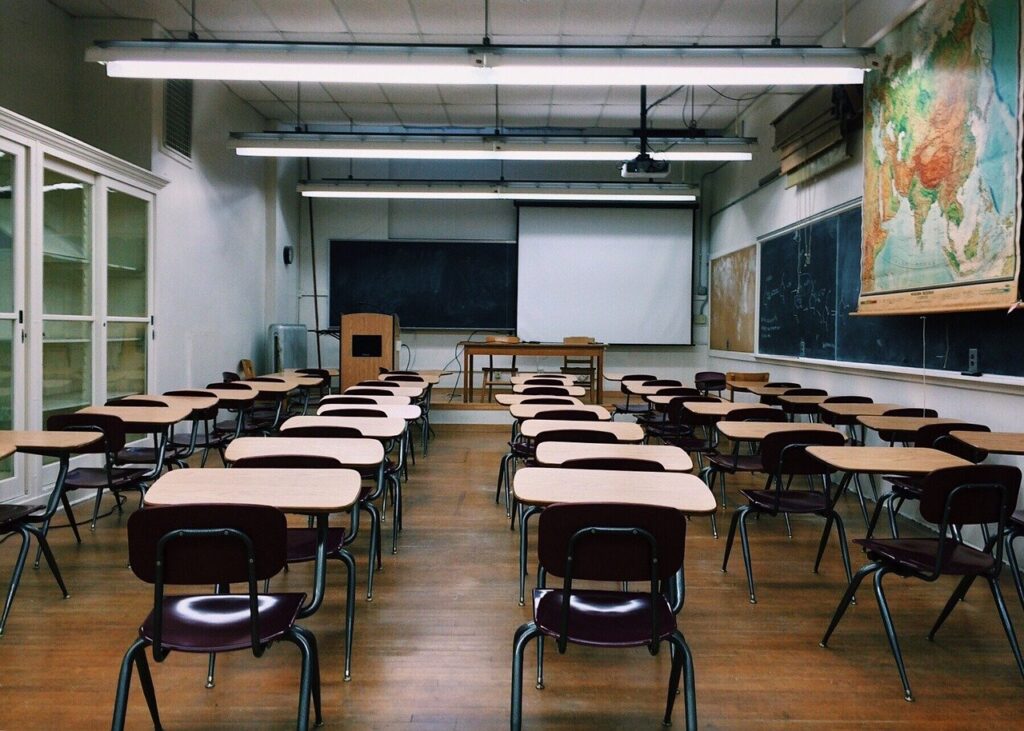
It is not just the attitudes of fellow students and their teachers towards them that make them feel like outcasts. The textbooks that students are expected to learn from feature insults about the founder of the Ahmadiyya Muslim Community, Hazrat Mirza Ghulam Ahmad (peace be upon him).
One textbook states,
‘It is a sin to speak with or do any business with Qadianis [a derogatory term for Ahmadi Muslims]’.
Another schoolbook contains a sticker that reads,
‘Any communication with Qadiyanis or friendships is completely haram [forbidden].’
Other schoolbooks label Ahmadi Muslims as apostates and worthy of death.
How can Ahmadi Muslim students be expected to remain safe and focus on studies if the persecution their community faces is imprinted in the textbooks they study from?
Rather than being a place for meeting, learning, excelling and enjoying life, for Ahmadi Muslim students, the education system greets them with discrimination at primary, secondary and university levels to the extent that it has become the norm.
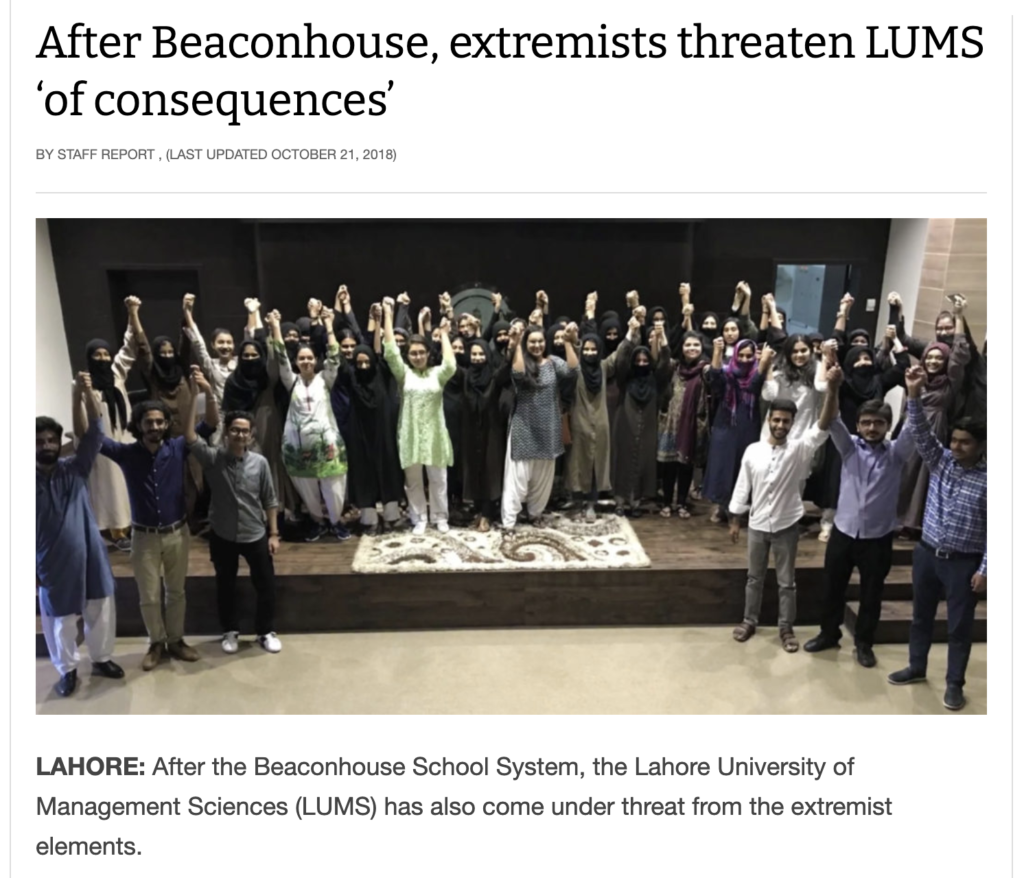
Students as young as six have been denied entry into school for being an Ahmadi Muslim. Higher up the education system, students have been rusticated, on grounds of faith, from universities despite nearing the completion of their courses. Such events are shockingly commonplace.
If there are any Ahmadi Muslim teachers in schools, then students are encouraged to report them teachers to local anti-Ahmadi Khatme Nabuwwat councils.
Educational institutions have become a source of fear rather than a source of knowledge.
Even top institutions in Pakistan cannot escape the threats of the clerics: students from the respected Lahore University of Management Sciences (LUMS) visited the Ahmadi Muslim town of Rabwah, to understand the life experience of Ahmadi Muslims. An assistant Professor wanted to ‘express solidarity with the community’ by reaching out, but it was not long before clerics made threats against them, simply for engaging with Ahmadi Muslims.
Ahmadi Muslim children also face restrictions when seeking to learn about their faith. In Punjab the community’s publications are banned including the writings of their holy founder.
Furthermore, Ahmadi Muslims are not even permitted to publish the Holy Quran, the holy book of Islam and the community’s websites are banned by the government, as is the community’s television channel Muslim Television Ahmadiyya International.
Life beyond education fares just as bad.
In democratic societies, the right to vote is cherished, as it gives voice to the people. However even here the state has clamped down and Ahmadi Muslims are denied this right. To vote Ahmadi Muslims must either renounce their faith as Ahmadi Muslims or self-identify as non-Muslims, and neither of these are acceptable options for Ahmadi Muslims.
When applying for national ID cards and a passport, the government requires all Pakistanis to sign a declaration that the founder of the Ahmadiyya Muslim Community is a false prophet and that Ahmadi Muslims are non-Muslims. Clearly Ahmadi Muslims cannot sign such a declaration, so their national ID cards and passports record their religion as ‘Ahmadi’ – rather than Islam – a label that condemns them to discrimination when applying for jobs or seeking to register for government services.
This also makes it impossible for Pakistani Ahmadi Muslims to perform the Hajj (the sacred pilgrimage to Mecca) that is one of the Five Pillars of Islam, as the passport states an Ahmadi’s religion as ‘Ahmadi and not ‘Islam’ – and as the law classifies this as a non-Muslim faith, the Saudi Authorities will not permit them to go for pilgrimage.
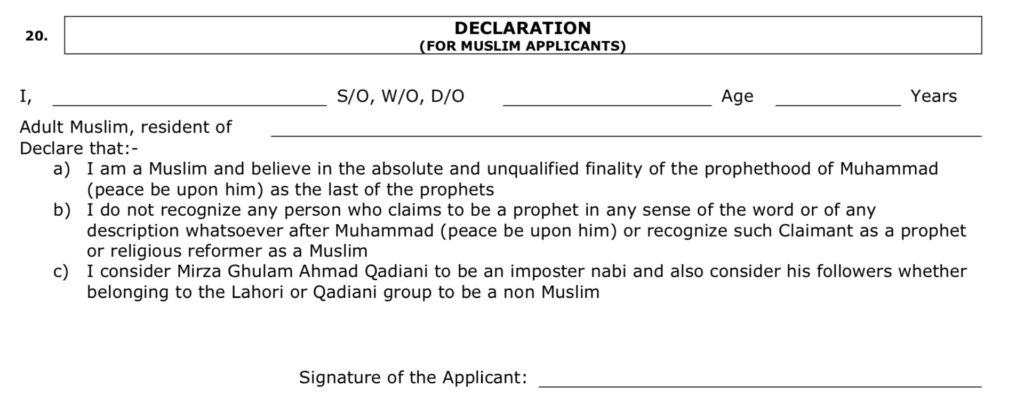
In Pakistan, Ahmadi Muslims are denied the right to peaceful assembly and this extends to holding any Islamic gatherings.
Ahmadis are forbidden from honouring their sacred traditions such as the religious sacrifice on Eid
At times of celebrations such as Eid, Ahmadi Muslims are forbidden from performing the Qurbani – the religious sacrifice of an animal in memory of the sacrifice made by Prophet Abraham (peace be on him) that all Muslims carry out on Eid-ul-Adha.
The Government of Pakistan has intervened in every aspect of an Ahmadi Muslim’s life. Even in preparation for a wedding, one of the happiest days in anyone’s life, Ahmadi Muslims are prohibited from using Islamic prayers on invitation cards (Ahmadi Muslims have been arrested for this ‘crime’ too).
There are threats in public spaces too. In shops across Pakistan one finds signs on display that say they will not serve Ahmadi Muslims and that they are not even allowed to enter the store.
Rather than being allowed to work and contribute to the progress of the country Ahmadi Muslims are routinely disadvantaged and harassed at work and in some cases even denied the right to work.
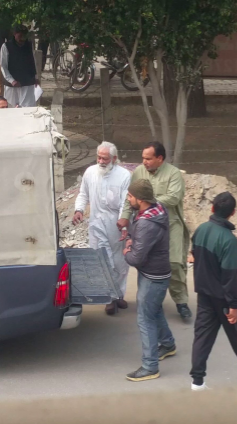
In 2017 Captain Muhammad Safdar Awan, a Pakistan Muslim League politician, made a speech in the National Assembly calling for Ahmadi Muslims to be denied the right to enrol in the army and for them to be rooted out of all government services.
In 2020 the Bar Associations of Islamabad and Multan also called for Ahmadi Muslims to be denied the right to register as lawyers, adding that Ahmadi Muslims were non-Muslims and apostates.
Even when running their own business Ahmadi Muslims are not safe. Their businesses have been attacked, burned and owners killed on grounds of faith. In Rabwah the government used anti-terror laws to charge an eighty-year-old bookshop owner, Mr Abdul Shakoor, for possessing the Holy Quran. His store was raided by Punjab’s Counter Terrorism Department and he was sentenced to eight years in prison under anti-Ahmadi laws and anti-terror laws.
Since 1984, hundreds of Ahmadi Muslims have been murdered on grounds of faith.
Ahmadi Muslims in all professions are targeted – even those who have committed their lives to serve the people.
Dr Tahir Ahmed (aged 31) was shot dead by a gunman who was waiting outside his home and opened fire as soon as his family opened the front door to leave home after prayers.

In February 2020, eleven-year-old Tanzeel Ahmad’s murdered body was found in a steel trunk in his neighbour’s apartment after he had gone to fetch his sister’s doll which she had left there. Signs of torture were evident on his body; a cloth was found stuffed in his mouth.
In March 2016, Ahmadi Muslim Mr. Qamar ul Zia, father of three sons, was stabbed to death outside his own home after returning from picking up his children from school. Even though the murderer was arrested on the scene he was acquitted of the crime.
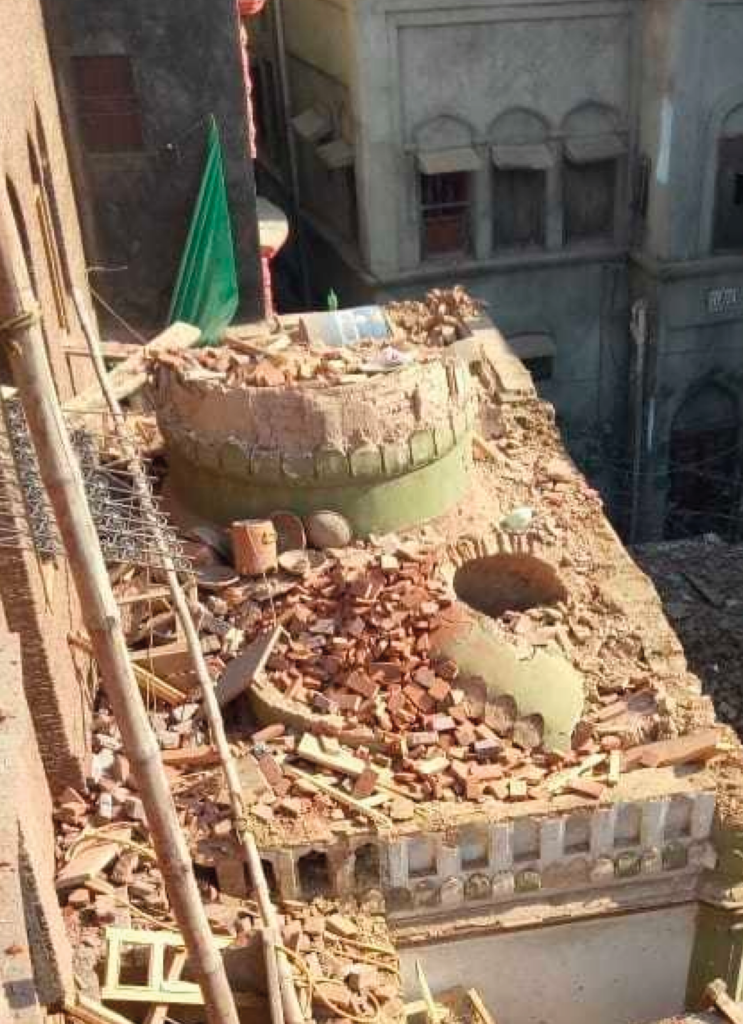
In August 2020, Mr Mairaj Ahmad, 61, was shot dead outside his medical store in Peshawar by unknown assailants on motorcycles. He had no dispute with anyone but his family had been the victim of a viscious hate campaign on social media before his murder.
Peshawar also played host to the killing Prof. Dr. Naeemuddin Khattak, 57, in October 2020. A faculty leader in a local college, Prof. Khattak’s car was stopped and he was shot dead by two men on motorcycles. He left behind a widow, two sons, and three daughters.
Ahmadi Muslims are also barred from calling their place of worship a mosque and these are targeted by extremists and officials. Mosques have been attacked, sealed by the authorities, taken over by extremists, set on fire and even had minarets torn down under the watch of officials. For an Ahmadi Muslim, to worship in a mosque is to put your life at risk.
Since 1984, hundreds of Ahmadi Muslims have been murdered on grounds of faith.
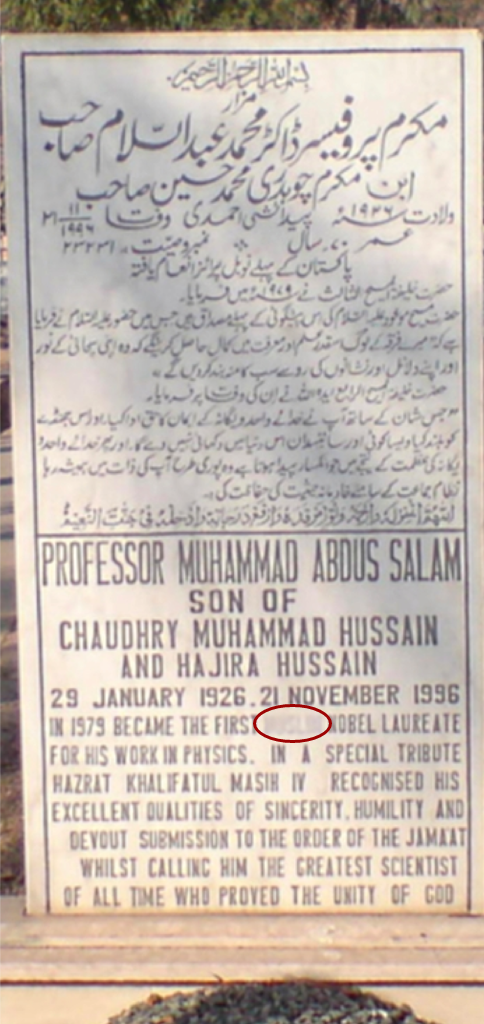
Ahmadi Muslims are targeted even after death.
There are dozens of reported incidents where Ahmadi Muslims have been denied burial and their bodies have even been exhumed. In February 2019, the late Mr. Abdul Wajid Khan was due to be buried in Rabwah. As his coffin was being prepared to be taken there, local clerics came out in protest, prevented the coffin from leaving and demanded he be buried by his home and not with other Muslims.
In May 2020, approximately 50 people including the police raided private property to vandalise the headstone of Mr. Nafir Ahmad of Shaukatabad Colony.
In June 2020, a local mob, including clerics and the police, proceeded to damage and desecrate Ahmadi Muslim tombstones and removed the Quranic inscriptions on them.
Even Pakistan’s only Nobel scientist has not been spared. The grave of Ahmadi Muslim physicist, Professor Abdus Salam, has been desecrated with the word ‘Muslim’ scratched out from the headstone.
In their daily lives, Ahmadi Muslims are barred from practising their Islamic faith.
The police routinely turn a blind eye to the extremism of clerics, and the government makes no effort to remedy the legal basis for persecution.
Police bow to mob pressure and charge Ahmadi Muslims instead of the perpetrators leaving the murderers to roam free in search of their next victim.
